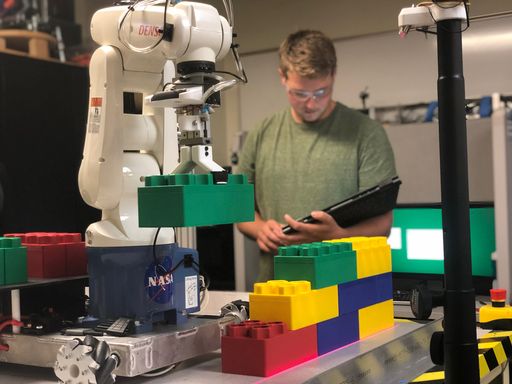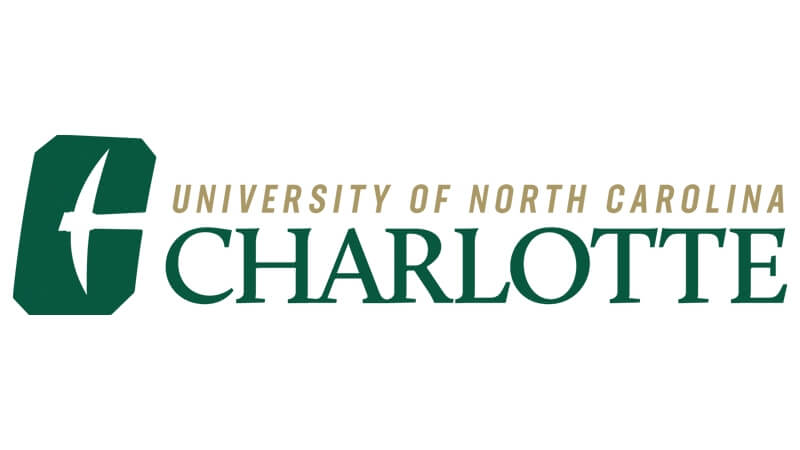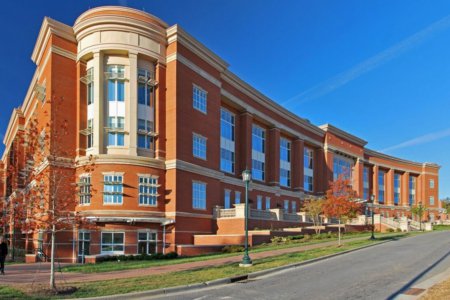The University of North Carolina at Charlotte (UNC Charlotte) consistently earns recognition as one of the premier academic institutions in the Southeastern US. Nestled in a picturesque suburban landscape, the university occupies a sprawling 1,000-acre wooded campus in the largest city in the Carolinas. Notably, UNC Charlotte boasts a convenient geographical location, a mere two-hour drive from scenic mountains and a three-hour drive from the inviting coastal areas, offering students and faculty a diverse range of natural attractions within easy reach.
It also helps that the school is in one of the country’s fastest-growing and most diverse cities. Charlotte is listed as one of the best places to live in the US by the US News & World Report. It has a diverse landscape, and key sectors in the Charlotte business community include manufacturing, healthcare, and the energy industry. A prominent hub in the energy sector, there is a highly connected, informed, and collaborative cluster of energy companies and organisations located here.

Source: UNC Charlotte
With this in mind, it makes sense that the university’s MS in Applied Energy and Electromechanical Engineering (AEEE) is a top choice. This programme, designed for discipline-specific and multidisciplinary education, is a gateway to professional development, technical mastery, and a commitment to lifelong learning. It has a unique blend of advanced coursework and research, providing students with the tools to shape the future of energy and electromechanical engineering.
Spanning 30 hours, full-time students typically take three semesters to complete a spectrum of courses focused in the areas of “Renewable Energy & Modern Grids” and “Robotic & Automated Systems”. These include Analysis of Renewable Energy Systems, Introduction to Robotics, Applied Mechatronics, Dynamic Systems Control and Design and Thermal Fluid Systems Modeling. It’s a well-rounded education that prepares you for the dynamic challenges of the field.
The MS is flexible, offering three programme options: Thesis, Project (non-thesis), and Comprehensive Exam. This makes it easier to choose an education path that best suits your interests and future goals. You can benefit from graduate assistantship opportunities and research possibilities in a selection of topics such as energy industry modernisation, renewable energy systems, design and control dynamic systems, process modelling and digital twins, and more.
As graduates, you’re set to seize a long list of career opportunities. “Completing my MS in AEEE opened up so many doors for me and allowed me to reach my goal of working in R&D for renewable energy,” says Casey Nichols, a graduate. “I really enjoyed the coursework and the time I spent working with the professors in the programme. I highly recommend the programme to any individuals looking to enter or grow in the energy field.”
For many students, other than the campus’s location, the stellar faculty is what draws them in. This was the case for Dhawal Joshi, an AEEE graduate. “The faculty for this department and the level of research was something that pulled me towards understanding more about the programme,” he says. “From data science to research on sensor technologies, students could get into areas that interest them the most.”
Joshi adds that Dr. Maciej Noras helped him tremendously, not only by providing opportunities in the department but also by guiding his professional development and research. After graduation, he got hired at an energy consulting firm based in California and still uses much of what he learned today. “One of the core courses was Engineering Analysis 4, which covered a lot of statistical concepts,” Joshi says. “This course was particularly helpful in my research and still plays an important role in my work.”

Source: UNC Charlotte
This interdisciplinary degree engages the knowledge base of multiple engineering disciplines, including Electrical, Mechanical, Instrumentation and Controls, Software, Computer, and Energy engineering. You will also collaborate with other areas like Civil Engineering, Environmental Engineering, Infrastructure Systems, and Computer Science. This broad knowledge base prepares you for almost any industry. “Having an AEEE degree is great for opening doors to a much bigger world,” says PS. “The course flexibility and customisability can help give you a more rounded background in comparison with some other master’s degrees which focus you into a single slot.”
There is great diversity in the career outcomes for AEEE degree holders. For instance, Casey Nichols is a research engineer at the National Renewable Energy Laboratory (NREL). He is working on advancing wave and tidal energy technologies to take advantage of the abundant supply of renewable energy the ocean has to offer. Robert Logan Garris supplies consulting services for Siemens-Energy facilities, which include providing programming, engineering, and infrastructure support for CNC, thermal barrier coatings, laser drilling, and EDM operations. Christopher Benfield is a future tech marketing engineer on laserjet printers employed at HP in Boise, Idaho. Some graduates of the AEEE program pursue a PhD. The possibilities are endless.
To make a difference with a master’s from UNC Charlotte, click here to apply now.
Follow UNC Charlotte on Facebook, Instagram, Twitter, YouTube and LinkedIn













